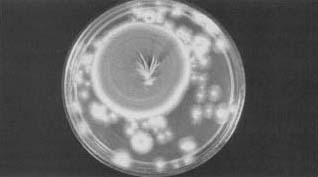Penicillin
Penicillin is a chemical produced in common molds which has potent antibacterial properties. Bacteria are tiny organisms that have the potential to cause a huge variety of infections in every organ system of the human body. The accidental discovery of penicillin in the twentieth century may be one of the greatest milestones in medical history. Penicillin opened the door to a variety of new "miracle drugs" that have saved the lives of millions. Until the discovery of penicillin, the only treatments available for bacterial infections were quinine, arsenic and sulfa drugs. All of these were highly toxic (poisonous).
Fleming's Mold
Scottish bacteriologist Alexander Fleming (1881-1955) discovered penicillin by accident in 1928. While conducting research using several petri dishes of bacteria cultures, he accidentally left one of the cultures uncovered for several days. Fleming found the dish contaminated with a mold. He was about to discard the culture when he noticed that the mold was dissolving all the bacteria near it.
Fleming recognized the importance of what was happening. He put a sample of the mold under his microscope and tested it against several types of bacteria. Fleming found that something in the mold stopped or slowed the growth of the bacteria. Because the mold was from the genus Penicillium, Fleming named the part of the mold that attacked bacteria "penicillin." He was unable to separate the penicillin from the mold, however.
In 1935, at Oxford University in England, researchers Howard Walter Florey (1898-1968) and Ernst Boris Chain (1906-1979) stumbled across an article by Fleming about his work with penicillin. They obtained a culture (sample) of Fleming's original mold and were able to separate and purify the penicillin. Florey began testing the penicillin on animals and found that it was nontoxic (did not harm living cells) as well as an effective antibiotic. Furthermore, it did not interfere with the activity of white blood cells (the body's natural defenders against infection).
Penicillin in World War II
Trials of the drug on humans were so successful that great quantities of penicillin were used to treat infections suffered by wounded and ill soldiers during World War II (1939-1945). England was not able to manufacture penicillin in quantity because of its involvement in the war. Florey traveled to the United States and convinced the government to sponsor research on the mass production of penicillin. An efficient method of mass-producing penicillin was developed using fermentation and a cornstarch medium. This basic technique is still used to produce many antibiotics.
Penicillin prevented thousands of wartime deaths from gas gangrene and other infections. Now the race began to discover its molecular structure so that it could be produced synthetically (in a laboratory from its chemical compounds).
In the mid-1940s English researcher Dorothy Crowfoot Hodgkin (1910-) used X-ray crystallography and an early IBM card-punch computer to determine the chemical structure of penicillin. The door was now

Penicillin is used to treat any number of infections, including syphilis, meningitis, and pneumonia. Penicillin has reduced the threat of bacterial infections. The capability to treat potentially life-threatening infections has permitted the development of surgical operations, organ transplants, and open heart surgery. It has also vastly improved the treatment of burns.
Because the discovery and uevelopment of penicillin is rightly regarded as one of the greatest achievements in medical history, many of the scientists who worked on it have been highly honored. Fleming, Florey, and Chain shared the 1945 Nobel Prize in medicine for the development of penicillin. For their work with penicillin as well as other research, Hodgkin and Woodward also received the Nobel Prize, in 1964 and 1965, respectively.
[See also Antibiotic ; Open-heart surgery ; Quinine
best regard
thank you
Nicole
Thanks a lot
~~Chris~~
It really helped me get information and I also learned new things.
*thanx,catie!!!*
thanks!
~A ت